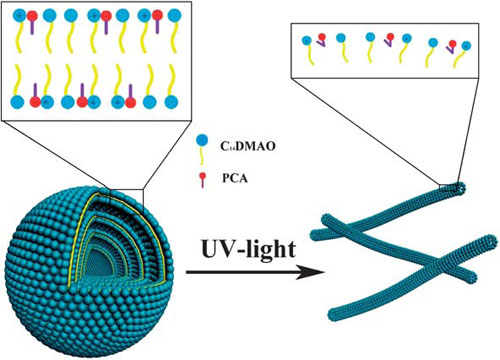Self assembled aggregates formed by surfactants in solution have attracted widespread interest because of their being simple model systems for biological membranes and their possible applications in various fields of colloids, bionics, and soft matter, especially as templates for the synthesis of materials. As good candidates for drug delivery and mimicking biological membranes, vesicles formed by natural and synthetic surfactants have been researched in detail for more than half a century. Wormlike micelles have found numerous applications in different areas such as in cosmetic products and in the oilfield industry.
Researchers at Shandong University and Lanzhou Institute of Chemical Physics have constructed a new complex fluid system of a nonionic surfactant and a photosensitive aromatic molecule, in which the phase transition from vesicles to wormlike micelles induced by UV irradiation was obtained.
Cryo-TEM observations and rheological measurements were used to determine the phase transition from vesicles to wormlike micelles easily controlled via some external conditions, i.e., light irradiation. To the best of the researcher’s knowledge, it is the first observation of the phase transition from vesicles to wormlike micelles in catanionic surfactants in solution. In this case, trans-PCA/C14DMAO complex fluid system can be turned into cis-PCA/trans-PCA/C14DMAO one via photo-irradiation, inducing the bilayers to turn to wormlike micelles. This simple strategy to accomplish a complete transition from vesicles to wormlike micelles could help achieve further applications in different areas, such as drug delivery, oilfields and biochemistry.
The work has received support from the National Natural Science Foundation of China, National Program on Key Basic Research Project of China (973 Program) and NFS of Shandong Province.
The findings have been published in Soft Matter (Soft Matter, 2011, 7, 10713–10719).
Soft Matter Paper

A scheme of the process of multilamellar vesicles turning to wormlike micelles induced via photo-irradiation.

